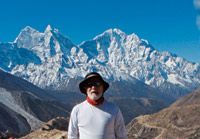- Case-Based Roundtable
- General Dermatology
- Eczema
- Chronic Hand Eczema
- Alopecia
- Aesthetics
- Vitiligo
- COVID-19
- Actinic Keratosis
- Precision Medicine and Biologics
- Rare Disease
- Wound Care
- Rosacea
- Psoriasis
- Psoriatic Arthritis
- Atopic Dermatitis
- Melasma
- NP and PA
- Skin Cancer
- Hidradenitis Suppurativa
- Drug Watch
- Pigmentary Disorders
- Acne
- Pediatric Dermatology
- Practice Management
- Prurigo Nodularis
- Buy-and-Bill
Article
Nine lives: Used to challenges, derm faces his biggest test
Dermatologist Dennis J. Doud, M.D., jumps into things with both feet. His first mountain-climbing experience was Mount Everest; his first marathon, Boston.
Dermatologist Dennis J. Doud, M.D., jumps into things with both feet. His first mountain-climbing experience was Mount Everest; his first marathon, Boston.
He also has dodged his share of bullets. A day before this small-town general dermatologist was to go to the "bush" in Vietnam, he got lucky and was assigned to be an Army programmer.
He survived leukemia nine years ago, and thought he was in the clear until he learned only recently that he was diagnosed with what is the biggest hurdle yet - corticobasal degeneration, a rare brain disease.
A dermatologist for more than 30 years, Dr. Doud has chosen to spend his career in solo general practice. He finished dermatological training in the Midwest, and settled quickly on the warmer climate of Greenwood, S.C., a rural, hilly town of about 40,000 people.
Dr. Doud's own experience being a patient with cancer taught him, he says, about the seriousness of what he does as a doctor.
Time for travel
After losing his first wife to Hodgkin's disease when she was only 39, Dr. Doud decided life was too short to wait to travel. He decided to take about two and half months off each year for adventure.
Dr. Doud saw an ad last year for a trip to trek to Mount Everest's base camp. No previous trekking experience was required, according to the ad.
Despite his friends' warnings about the dangers of cerebral and pulmonary edemas and other altitude-related sicknesses, he took off for Mount Everest in April 2008.
He learned about suspension bridges during one of his first long climbs. Armed with a camera and the desire to take pictures on the bridge for a friend at home who is scared of heights, Dr. Doud quickly put his camera away and looked straight ahead as the seemingly feeble bridge bobbed in the wind.
Some trails, he says, were maybe 2 feet wide with mountain cliffs on one side and monumental drops to rivers on the other. The yaks that accompanied the 30 clinicians on the trip, as well as sherpas and porters, barely negotiated the trails.
Although Dr. Doud thought each day about going home, he says it was the view of Mount Everest that helped to keep him going.
Dr. Doud made it to about 400 feet short of Mount Everest's base camp, which is at 17,600 feet. The climb was a huge accomplishment. The altitude is nearly as high as many of the highest peaks in the United States, he says.
Biggest hurdle
Still, Dr. Doud's biggest hurdles have been physical challenges.
"I almost died from hairy cell leukemia, but now the leukemia is cured," Dr. Doud says.
The brush with cancer prompted Dr. Doud - an avid golfer - to travel the next five years to Scotland on golf trips.
He suspected something might be wrong when his wrist did not heal after surgery to address what doctors thought was carpal tunnel syndrome. Nerve pain in his right hand and wrist caused him problems long after the surgery.
"I went to several neurologists and found out I had a brain disease called corticobasal degeneration," Dr. Doud tells Dermatology Times.
Dr. Doud has entered a clinical trial for the disease using lithium, which has been shown to have a positive effect on mice. He still works, but he has cut his daily patient load from 65 to about 55 patients.
"I am blessed. I have thought about this and have compared it to Everest and Vietnam, which have given me inspiration and strength to battle this thing," he says.

Dennis J. Doud, M.D.Born:
January 1945
Sioux City, Iowa
Medical school:
University of Nebraska
Omaha, Neb.
Internship:
Tripler Army Medical Center
Honolulu
Dermatology residency:
University of Nebraska
Creighton University Hospital
Omaha, Neb.
Family:
Wife, Denise; two daughters, ages 39 and 19
Hobbies:
Golf, skiing, exercise





